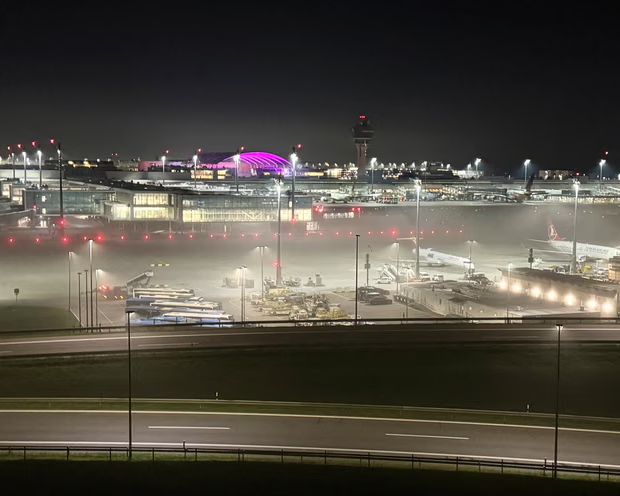Late Thursday night, Munich Airport was plunged into chaos after multiple drone sightings forced the suspension of flight operations. The disruption triggered widespread travel setbacks, diplomatic scrutiny, and renewed urgency across Europe over how to protect critical infrastructure from unmanned aerial threats.
The Disruption
Authorities reported that 17 departing flights were cancelled and 15 incoming flights diverted, affecting nearly 3,000 passengers. The airport closure lasted until early Friday morning, when operations resumed after air traffic control lifted the temporary halt. Officials said several drones had been spotted around restricted airspace, prompting an immediate safety response.
The incident comes amid heightened tension in Munich, following a bomb scare earlier in the week that temporarily shut down Oktoberfest. The city was already on alert as it entered the long weekend around German Unity Day, when travel volumes typically surge.
Political & Security Repercussions
Bavaria’s Prime Minister Markus Söder urged swift legislative changes, saying police “must be able to shoot drones down immediately” rather than wait for military intervention. CDU/CSU parliamentary leader Jens Spahn echoed those demands, calling for an agile drone defense system capable of neutralizing threats in real time.
The debate ties into broader European discussions over a pan-EU “drone wall”—a defense network of sensors, jammers, and mitigation systems designed to monitor and counter aerial intrusions. The Munich incident adds momentum to long-standing calls to accelerate its deployment.
Broader Trends & European Context
Drone sightings have become more frequent in European airspace, particularly near airports and critical infrastructure. In 2025, Germany’s civil aviation authority recorded over 140 drone incursions—up from previous years. Similar disruptions have struck airports in Denmark, Norway, and the Baltic region, elevating fears of coordinated hybrid threats.
While some media and officials speculated about Russian involvement, no direct link has yet been confirmed. Moscow has denied responsibility in similar drone incidents. However, European governments are taking the possibility seriously, with NATO and EU institutions pushing plans to bolster shared air defense capabilities.
Already, at a summit in Copenhagen, EU leaders underscored the urgency of collective action to defend their borders from unmanned aerial threats. The Munich disruption now provides a tangible catalyst for accelerating those efforts.
What Comes Next
Investigators are reviewing radar, video, and eyewitness reports to pinpoint the types, trajectories, and origins of the drones. If found to be hostile or state-sponsored, the consequences could extend far beyond aviation, touching on national security and geopolitical posturing.
In parallel, lawmakers in Germany are preparing draft legislation to expand police authority over drone threats—not limited to military zones. Across Europe, countries are revisiting rules of engagement for civilian defense against unmanned aerial vehicles.
For now, the Munich incident stands as a stark reminder: a drone over a major airport is no longer a theoretical threat—it’s an urgent challenge that demands coordinated, high-tech solutions.











